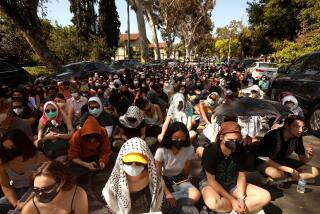Readers React: Occidental administrators don’t deserve harsh treatment by students
To the editor: I was an Occidental College student for one year before I transferred to UC Berkeley, where I sought greater independence. I also felt intimidated by many of the Oxy students who looked better, dressed better and were more socially adept than I was. (“What’s different about the latest wave of college activism,” Nov. 18)
It was 1956. I wanted a college atmosphere that was less homogeneous and stressful. I found that at UC Berkeley. Yet looking back, I cherish my experience at Occidental.
Since then, Occidental has become much more attractive to students like me and perhaps less attractive to those who resemble some of the Oxy students I knew in 1956. Over the years, administrators have done the work necessary to make this happen.
I would never have dreamed that many of the students most benefiting from the changes would treat the current administrators in the shabby way these students have done this last week, issuing an ultimatum calling for the resignation of the president unless their list of demands is accepted.
Gerry Rankin, Glendale
..
To the editor: The current president of Occidental College might take a lesson from the actions of Paul Smith, the president of Whittier College from 1951 to 1969.
In 1968, in support of the demands of our Black Students Union, the student body occupied the administration building. Smith was out of town but quickly returned.
After listening to the demands — including an ethnic studies major, ethnic food in the campus restaurant, more black professors and coaches, and more black speakers at convocation — he agreed and assigned responsibilities to the various deans, with specific deadlines for completion.
If Whittier College could do that nearly 50 years ago, why can’t other schools do it today?
Marie McDonald Sirney, Newport Beach
..
To the editor: The “new power in protest” that college students are finding resides entirely in its vagueness. Words like “diversity” and “inclusion” sound wonderful but remain undefined.
This is not a revolution akin to the 1960s. Students are not protesting the Vietnam War, the lack of a right to vote, lynchings or anything big and overt. They are tweeting and using Facebook to complain about tiny infractions that are exclusively in the eye of the beholder.
Why not write a great novel, screenplay or memoir about social exclusion and inclusion? Or write a great song or choreograph a ballet? Tweeting takes neither intelligence nor hard work.
Michael Guista, Nipomo, Calif.
Follow the Opinion section on Twitter @latimesopinion and Facebook
More to Read
A cure for the common opinion
Get thought-provoking perspectives with our weekly newsletter.
You may occasionally receive promotional content from the Los Angeles Times.






